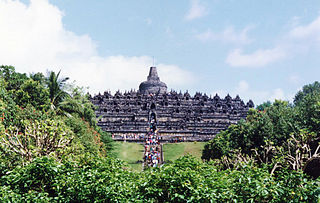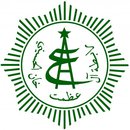Kangjeng Susuhunan Drajat | |
|---|---|
| Born | Raden Qasim 1470 |
| Died | 1522 Paciran, Lamongan |
| Nationality | Indonesian |
| Era | Demak Sultanate |
| Organization | Walisongo |
| Title | Kangjeng Susuhunan Drajat |
| Father | Sunan Ampel |
Sunan Drajat was born in 1470 CE. He was one of the Wali Songo or "nine Saints", along with his brother Sunan Bonang and his father Sunan Ampel to whom is attributed the establishment of Islam as the dominant religion amongst the Javanese, Indonesia's largest ethnic group.
He was a descendant of Majapahit nobility in Tuban and a Chinese captain named Gan Eng Cu. [1]
Like his brother, he composed gamelan songs as a means for spreading Islamic teachings on Java. One example was the tune Gending 'Pangkur'. [2]
In 1502 CE, he built the masjid in the village of Jelag in Paciran (north of Surabaya) [3]

The Wali Songo are revered saints of Islam in Indonesia, especially on the island of Java, because of their historic role in the spread of Islam in Indonesia. The word wali is Arabic for "trusted one" or "friend of God", while the word sanga is Javanese for the number nine.
Malik Ibrahim, also known as Sunan Gresik or Kakek Bantal, was the first of the Wali Songo, the nine men generally thought to have introduced Islam to Java.
Sunan Kalijaga was one of the "nine saints" of Javanese Islam. The "Kalijaga" title was derived from an orchard known as "Kalijaga" in Cirebon. Other accounts suggest that the name derives from his hobby of submerging himself in Kali. Others note that the name Kalijaga derived its nature from the Arabic notion of qadli dzaqa which means "holy leader" in the sultanate.
Sunan Gunungjati (1448–1568) was one of the Wali Songo or nine saints of Islam revered in Indonesia for the propagation of Islam as the dominant religion in the region. He founded the Sultanate of Banten and the Sultanate of Cirebon on the north coast of Java.
Sunan Kudus, founder of Kudus, is one of the Wali Sanga, of Java, Indonesia to whom the propagation of Islam amongst the Javanese is attributed.

Sunan Giri, and Muhammad Ainul Yakin is considered one of the Wali Sanga in Indonesia. His family is from Hussani Sayid, no historical evidence that he is from Qadiri family

The Demak Sultanate was a Javanese Muslim state located on Java's north coast in Indonesia, at the site of the present-day city of Demak. A port fief to the Hindu-Buddhist Majapahit kingdom thought to have been founded in the last quarter of the 15th century, it was influenced by Islam brought by Muslim traders from China, Gujarat, Arabia and also Islamic kingdoms in the region, such as Samudra Pasai, Malacca and Bani (Muslim) Champa. The sultanate was the first Muslim state in Java, and once dominated most of the northern coast of Java and southern Sumatra.
Sunan Bonang was one of the nine Wali Songo, along with his father Sunan Ampel and his brother Sunan Drajat who are said to have established Islam as the dominant religion amongst the Javanese, Indonesia's largest ethnic group.
Sunan Ampel was one the nine revered Javanese Muslim saints, or Wali Songo, credited with the spread of Islam in Java. According to local history, around Demak the mosque of Demak Masjid Agung Demak was built by Sunan Ampel in 1479 CE, but other sources attributed the construction of the mosque to Sunan Kalijaga.
Sunan is the shorter version of "Susuhunan", both used as an honorific on the island of Java, Indonesia.

The Ba'Alawi tariqa, also known as the Tariqa Ba Alawiyya is a Sufi order centered in Hadhramawt, Yemen, but now spread across the Indian Ocean rim along with the Hadhrami diaspora. The order is closely tied to the Ba'Alawi sadah family.

Babad Tanah Jawi, is a generic title for many manuscripts written in the Javanese language. Their arrangements and details vary, and no copies of any of the manuscripts are older than the 18th century.
Sunan Muria is, according to the Babad Tanah Jawi manuscripts, one of the nine Wali Sanga involved in propagating Islam in Indonesia.
Sunan Sitijenar is, according to the Babad Tanah Jawi manuscripts, one of the nine Wali Sanga to whom Indonesian legend attributes the establishment of Islam as the dominant religion among the Javanese, Indonesia's largest ethnic group.
Ali al-Uraydi ibn Ja'far al-Sadiq, better known simply as Ali al-Uraydi, was the son of Ja'far al-Sadiq and the brother of Isma'il, Musa al-Kazim, Abdullah al-Aftah, and Muhammad Al-Dibaj. He was known by the title al-Uraydi, because he lived in an area called Urayd, about 4 miles from Medina. He was also known by the nickname Abu al-Hasan.

Al Azmatkhan'/Azmatkhan' al-Husayni, also spelled Azmat Khan, Azhmatkhan, al-Azhamatkhan or al-Azhamat Chan are a family originating in Hadhramaut. They trace their lineage to Sayyid Abd al-Malik Azmatkhan ibn Alawi Ammul Faqih, a descendant of Husayn ibn Ali. Sayyid Abd al-Malik emigrated from Hadhramaut to India in the 14th century AD, earlier than other emigrations from Hadhramaut.

The Menara Kudus Mosque or Al-Aqsha Mosque is located in Kudus in the Indonesian province of Central Java. Dating from 1549, it is one of the oldest mosques in Indonesia, built at the time of Islam's spread through Java. The mosque preserves the tomb of Sunan Kudus, one of the nine Islamic saints of Java, and is a popular pilgrimage point.
Pangeran Pekik was a Javanese prince, and son of the last Duke of Surabaya, Jayalengkara. After the Mataram conquest of Surabaya, he was forced to live in Mataram court. He was executed in 1659 on the orders of Mataram's King Amangkurat I, who suspected him of conspiracy.

Islam is the most common religion in the Indonesian province of East Java, embraced by 96.7% of the whole population. Throughout its history, East Java has been considered one of the heartlands of Islam in Indonesia; the province experienced one of the earliest proliferations of Islam, as well as the establishment of the largest Islamic mass organization in Indonesia, Nahdlatul Ulama.